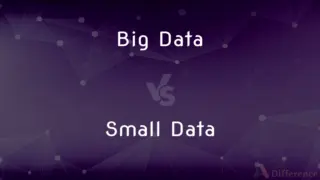Raining vs. Rainy — What's the Difference?
Edited by Tayyaba Rehman — By Urooj Arif — Updated on April 17, 2024
Raining describes the action of precipitation occurring, while rainy refers to weather conditions characterized by frequent or ongoing rain.

Difference Between Raining and Rainy
Table of Contents
ADVERTISEMENT
Key Differences
Raining specifically indicates the act of precipitation falling from the sky, such as water in the form of droplets. Whereas, rainy is an adjective used to describe a day or weather conditions that involve or are characterized by rain.
When it's raining, the focus is on the real-time event of rain occurring at that moment. On the other hand, a rainy day might not imply constant rain but suggests that rain is typical or expected at some point during the day.
The term raining is used in more immediate, observational contexts. Conversely, rainy can describe both current and general weather patterns, implying a tendency towards rain.
Discussions about raining often involve specific instances or periods when rain is falling. Whereas discussions about rainy weather might involve planning or preparing for days where rain is likely, regardless of whether it is raining at that moment.
In meteorology, raining is often quantified in terms of rate and duration. In contrast, rainy might be used qualitatively to describe climatic conditions over longer periods, such as a rainy season.
ADVERTISEMENT
Comparison Chart
Part of Speech
Verb (present participle)
Adjective
Usage Context
Describes an action
Describes conditions or mood
Temporal Reference
Immediate, ongoing action
General, possibly ongoing
Example Usage
It is raining now.
It is a rainy day.
Associated Terms
Precipitation, raindrops
Rainfall, wet weather
Compare with Definitions
Raining
Temporally specific, relating to the present.
Look outside; it’s raining now.
Rainy
Descriptive of a period or season.
The rainy season lasts from June to September.
Raining
Often associated with certain weather patterns.
When it’s raining, the streets quickly flood.
Rainy
Characterized by the presence of rain.
We need to prepare for another rainy day.
Raining
Can be used to emphasize the intensity of rainfall.
It’s raining cats and dogs.
Rainy
Often used to set expectations about weather.
The forecast says it’s going to be rainy tomorrow.
Raining
Used to describe a specific weather occurrence.
It's been raining all morning.
Rainy
Applies to general weather patterns.
It's typically rainy in this region during spring.
Raining
The act of rain falling from the sky.
It started raining just as we left the house.
Rainy
Can imply a mood or atmosphere.
The rainy weather makes the day feel gloomy.
Raining
Water condensed from atmospheric vapor and falling in drops.
Rainy
(of weather, a period, or an area) having or characterized by considerable rainfall
A rainy afternoon
Raining
A fall of such water; a rainstorm.
Rainy
Characterized by, full of, or bringing rain.
Raining
The descent of such water.
Rainy
Pouring with rain; wet; showery
Due to the rainy weather, we decided not to play in the park.
It's a very rainy day, so let's stay indoors.
Raining
Rainy weather.
Rainy
Abounding with rain; wet; showery; as, rainy weather; a rainy day or season.
Raining
Rains A rainy season.
Rainy
(of weather) wet by periods of rain;
Showery weather
Rainy days
Raining
A heavy or abundant fall
A rain of fluffy cottonwood seeds.
A rain of insults.
Rainy
Marked by rain;
Their vacation turned out to be a series of rainy days
Raining
To fall in drops of water from the clouds.
Raining
To fall like rain
Praise rained down on the composer.
Raining
To release rain.
Raining
To send or pour down.
Raining
To give abundantly; shower
Rain gifts.
Rain curses upon their heads.
Raining
Present participle of rain
Raining
A fall of rain.
Raining
Falling in drops or as if falling like rain;
Watched the raining apple blossoms
Common Curiosities
Can raining and rainy be used interchangeably?
No, raining is a verb describing action, while rainy is an adjective describing conditions.
How is rainy used in weather reports?
Rainy is used to describe days or periods likely to experience rain.
What does a rainy day suggest about outdoor activities?
A rainy day often suggests that outdoor activities may be disrupted or need adjustment.
Is rainy always related to bad weather?
Not necessarily; it depends on context and personal perception of rain.
Does rainy imply constant rain?
No, it suggests frequent or likely rain but not necessarily non-stop rain.
How do meteorologists use the term raining?
Meteorologists use it to describe active precipitation at a specific time.
What imagery is associated with raining?
Imagery of dark clouds, wet surfaces, and umbrellas are often associated.
How do children typically react to rainy days?
Responses vary; some may enjoy playing in the rain, while others might feel cooped up indoors.
What does raining mean?
Raining refers to the occurrence of rain, specifically the action of raindrops falling.
What type of verb is raining?
Raining is the present participle of the verb 'rain.'
How does the phrase "it’s raining" affect daily plans?
It usually indicates that plans involving outdoor activities might need to be changed.
Are there idiomatic expressions involving rainy or raining?
Yes, expressions like "saving for a rainy day" use rainy metaphorically.
What seasons are typically described as rainy?
Typically, the monsoon or specific transitional seasons are described as rainy.
Share Your Discovery

Previous Comparison
Glass vs. Ceramics
Next Comparison
Paramecium vs. EuglenaAuthor Spotlight
Written by
Urooj ArifUrooj is a skilled content writer at Ask Difference, known for her exceptional ability to simplify complex topics into engaging and informative content. With a passion for research and a flair for clear, concise writing, she consistently delivers articles that resonate with our diverse audience.
Edited by
Tayyaba RehmanTayyaba Rehman is a distinguished writer, currently serving as a primary contributor to askdifference.com. As a researcher in semantics and etymology, Tayyaba's passion for the complexity of languages and their distinctions has found a perfect home on the platform. Tayyaba delves into the intricacies of language, distinguishing between commonly confused words and phrases, thereby providing clarity for readers worldwide.















































